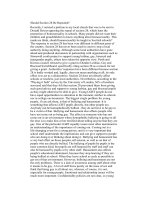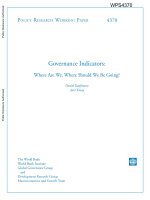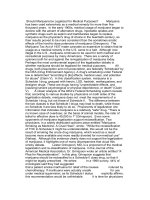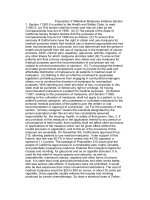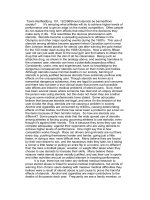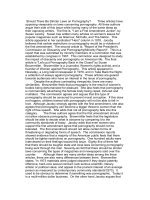should gambling be legalized
Bạn đang xem bản rút gọn của tài liệu. Xem và tải ngay bản đầy đủ của tài liệu tại đây (49.95 KB, 11 trang )
Should Gambling Be Legalized?
Over the past twenty or so years, great wealth and
improved economic and
social conditions have been promised to the communities that have
embraced
legalized gambling. However, with twenty years of experience it
is time to
look back and analyze whether this is true or not.
It could easily be said that gambling is as American as
apple pie.
Gambling has shaped American history since its beginning.
Lotteries were used
by The First Continental Congress to help finance the
Revolutionary war. Many
of our founding fathers, such as Benjamin Franklin, Thomas
Jefferson, and George
Washington, have sponsored private lotteries. It has been said
that "Our
founding fathers were just numbers guys in wigs" At one time
baseball would
have seemed to be the American pastime. This is not so now. In
recent years,
the attendance at casinos has nearly doubled the attendance at
all major league
baseball games, with close to 130 million people visiting casinos
every year.1
With so much money at stake, the average gambler does not
stand a chance
against this big business. The casinos go to every length to
analyze what makes
a gambler bet, stay longer, and loose as much money as possible.
Gamblers who come to casinos with the intention of
winning money are
habitually disappointed. As casino crime lord, Meyer Lansky's
universal
gambling truth states; "Gamblers never win, the house never
loses"2 Slot
Machines and most table games allow players to make bets where
the probability
of winning is relatively high. Frequent wins are characterized
by low payouts.
These frequent wins encourage further gambles with low payouts.
Frequent winning, low paying games are not the only way
casinos get
people to keep playing. Nothing less that psychological warfare
is going on at
casinos across the country. "The days of shaved dice, missing
face cards and
rigged roulette wheels are long gone. But the pursuit of
profitability in the
corporate era of gambling has turned the average casino into a
financially
hazardous place for betters"3 The casino's beliefs are all based
on the fact
that since the house has an advantage over the player, the longer
the house can
keep the player playing, the more money the house will make. The
gambling
industry spends millions each year to whether wider isles,
fresher air, and back
rests on the chairs at slot machines make a player stay longer.4
And why would
the casino care if somebody is comfortable? Because if each
better stays for
just a few more minutes, it could mean millions for the casinos.
Casinos have false ceilings with rooms above them where
some people
watch for cheats and swindlers. From these same vantage points,
are other
people with alternate jobs. They are hired to observe and study
what situations
encourage gamblers to play longer. And as stated before, the
longer people play,
the more money casinos receive.
These tricks of the trade are not just directed at the
comfort level of
the players, but also at their subconscious. Adding a certain
scent into the
air can make slot players spend up to fifty percent more than
average at times.
When money is turned into chips, in the player's mind, it
decreases it's value.
When a gambler asks a dealer for change for a hundred dollar
bill, the dealer is
under orders to give the player the lowest denomination possible,
in five dollar
chips. The player would easily spend the twenty chips as pocket
change. But
a twenty-five dollar chip is much more likely to be saved or
even cashed in.
Colors are a very important part of the subconcience
mind. Betters are
easily drawn to bright red machines, but tire of them quickly.
Many casinos now
put bright red machines on the outside of isles. Inside the
isles are the more
calm cool blue and greens that seem to encourage the player to
stay longer.
Gamblers are at the mercy of the big business casinos.
Most people do
not fully realize how much they are controlled by institutions
who have made a
science of studying gamblers behavior at the gaming tables.
It is a fact that the economic status of a gambler,
usually determines
the psychological meaning of gaming for him or her. "The higher
one's income ,
the more one will tend to see gambling as entertainment or as a
way to socialize
with other people. Conversely, the lower one's income, the more
gambling tends
to be seen as an investment"5 With the poor who cannot afford
such investments
as the stock market or real estate, gambling is meant to be
less as play and
more as a sincere chance to transform their lives for the better.
While the
poor do not spend much more than gambling than middle income
families, they do
spend a much higher percentage of their income.
Another disturbing situation in the gambling community is
the changing
percentage of women and young people who are becoming problem
gamblers. At
this time gambling is called "the fastest-growing teenage
addiction, with the
rate of pathological gambling among high-school and college-age
youth about
twice that of adults." In Atlantic City, the lure of gambling is
so strong that
over thirty thousand underage people are either thrown out, or
stopped from
entering the casino.6
Lobbyists for the gambling industry have made exorbitant
claims about
the benefits that states will receive from the legalization of
gambling. Among
the many claims made by lobbyists are the increase in jobs,
millions in revenue
from gambling taxes, and an overall better economy. On the
surface these
statements seem beneficial. But underneath lies a misconstrued
group of half-
truths that support the gambling industry. This is only because
the studies
that came up with these findings were funded entirely by
companies that have
interests in promoting gambling.7
There is a consistency in most of the stories the
lobbyists for the
gambling industry. They usually involve the myth that says that
big spenders
will spend money on local businesses and therefore boost the
economy. This
myth is false. In fact, most local economies are actually hurt
by the
existence of a casino. This is due to the actuality that the
majority of the
people to go to casinos are the people form the surrounding area.
Instead of
spending their expendable money in local stores on clothing or
appliances, they
gamble it away. So what the casino is really doing is recycling
the money of
the city and filtering out its profits. It is like running an
engine to power a
generator, to in turn power the engine; eventually it will run
out.
The reason such gambling Meccas as Las Vegas and Atlantic
City are so
successful is because they are tourist attractions. "The casino
explosion
elsewhere has helped , by simply whetting the appetite of a whole
new generation
of gamblers to try Las Vegas"8
The gambling industry has also taken advantage of
people's indecision.
They do this by stating that there is much potential demand for
gambling, and
without acting on it, casinos in neighboring communities and
Indian
reservations will open and take business away from them. They
claim that
casinos in nearby cities are presently reaping the benefits from
a gambling
based economy. Indecisive communities are told that by not
acting, they are in
fact losing money. Money that could be used to finance schools,
police, and
city services. So by forcing voters to make a quick decision,
they are actually
forcing them to open Pandora's box.
There are two general ways in which the gambling industry
encourages
crime. The fact that gambling leads to crime has even been
measured. In 1994
the national crime rate fell two percent, while in the thirty-one
places that
got new casinos the year before, saw a 7.7 percent increase in
crime.9
The people that commit these crimes are not usually
mobsters. "People
who engage in crime to support their compulsive gambling behavior
generally have
no prior record of criminal behavior."10 Governments are
creating environments
where normal people, without criminal backgrounds, are being
lured into
activities that could lead them to commit serious crimes. The
average
compulsive gambler who resorts to crime to support his or her
habit is someone
with a good job, better than average intelligence, and had stable
relationships.
With state governments sending the subtle message of
"gambling is OK",
the public lowers its defenses against it. According to a
national survey
conducted by Harrah, a large casino company, "51 percent of
American adults
believe "casino entertainment is acceptable for everyone."
Another 35 percent
say that it is "acceptable for others but not for me"11
Some five percent of gamblers are compulsive, and to
support their habit,
some of these gamblers turn to crime. According to a 1992
report by the
Minnesota state planning agency, about sixty percent of all
pathological
gamblers engage in crime to support their habit. Another 10
percent, go to jail
or are on probation.12 Different crimes are committed by
different ages of
gamblers. Adults tend toward white collar crimes like writing
bad checks, while
teenagers are more prone to steal from their parents.
The second way gambling effects crime is by attracting
organized crime.
Organized crime is probably not as prevalent on the surface of
the gambling
industry as it was in the forties, but it is still there. One
of the
claims made by gambling promoters, is that legal gambling shifts
illegal
gambling dollars into public fund. But, organized crime, by
offering better
odds and nontaxable payouts, has remained an active supplier of
gambling
products with its own niche in the market. The illegal gambling
market is so
enormous that its profits each year, surpass that of the top 100
American
corporations combined.13 This includes IBM, all the automotive
industries, and
many more.
To help gamblers pay for these billions lost, organized
crime sets up
loan sharks. These loan sharks together are a ten billion dollar
a year
business , with ninety percent of the earrings coming from
gamblers.14
Casinos have been the financial savior of many Native
American tribes in
the past decade. Taking what they thought as their sovereign
rights, which
exempted them from the laws of the states, tribes began putting
card rooms and
bingo halls in their reservations. Before long many people were
coming by the
busload to play.
Many tribes such as the Mashantucket Pequots, who are
only 350 in number,
began to seriously cash in on these casinos. The Pequots own the
largest and
most profitable casino in the western world, with an estimate
income of 2.6
billion dollars.15
The incoming money from the casinos helps with the living
conditions of
the tribe. The members see huge benefits such as better health
care, subsidized
mortgages, scholarships, and of course jobs. With such benefits,
there is bound
to be some people who would like to be members of the tribe.
People come to the
tribe with forged documents in an attempt to become Indian but
"you just can't
leap over and become an instant Indian" says Rick Hill of the
National Indian
Gaming Association.16
However, in the long run, tribal casinos may not be a
sustained source
of economic benefit. In the future, Tribal casinos will face
stiffer
competition from the non-indian gambling industry, as well as
from more tribal
casinos. "The Indian people can't have things too long before
the white man
begins coveting them.17
People only have a certain amount of discretionary money.
This is the
extra money that they have to spend on items other than their
monthly bills and
necessities. When casinos are introduced into an economy, it
tends to
"Cannibalize" consumer dollars that wound go to other local
businesses. If this
money was instead diverted to the local economy, it would not
only strengthen
the local businesses, but it would greatly diminish the costs of
caring for
compulsive gamblers.
In 1994, The Illinois Economic and Fiscal Commission
reported on five
locations who received new gambling operations. They found that
"no community
demonstrated any real identifiable increase in general
merchandise sales. In
specific locations there were actually indications of losses."18
According to
one local in Joliet, the behavior of the gambling crowd consists
of this: "they
on the boat, get off the boat, get in the car and drive home."19
Not only do casinos divert money away from legitimate
businesses, but
they also steal it from other forms of gambling. The public has
only so much
money to spend solely on entertainment. Horse and dog racing
have competed
against Casinos and suffered in communities where they have been
implemented.
One of the single hardest hit businesses by the gambling
industry is the
restaurants around the casinos. Casinos offer an enormous
amount of cheap food
at the casinos to attempt to keep people inside. Many casinos
have such
specials as "Women eat free at 6:00" to cover the slower times
of the day. The
losers are the neighborhood restaurants, many of whom soon go out
of business.
In Atlantic city, the number of restaurants dropped from 243 to
146 between 1977
and 1987.20
As convenience gambling increases, not only do local
businesses loose
consumer dollars, but governments loose the sales taxes they
would have received
if citizens would have made these purchases. All of this adds to
the drain on
local government.
Probably the most devastating consequences of the
gambling industry are
the hidden social costs imposed on the gamblers and on their
families. Gambling
is an addicting habit which should be controlled, but for the
most part is not.
Perhaps this is because widespread legalization of gambling is
such a relatively
new phenomenon that the long term effects have not been totally
seen.
The vast majority of citizens do not have a problem with
gaming, but
problem can be acquired. A study in Iowa showed that in 1989,
only 1.7 percent
of residents had a history of compulsive gambling. In 1995, four
years after
Iowa became the first state to admit riverboat gambling, the
number of
compulsive gamblers had jumped to 5.4 percent.21 This may be
that some people
had a tendency toward compulsive gambling but until it came to
their community
they did not have an opportunity to act upon this trait. It
seems that when
these people with inclination towards the addiction are allowed
to gamble, their
gambling problem comes to the surface.
Compulsive gamblers will bet until nothing is left:
savings, family
assets, personal belongings-anything of value that may be pawned,
sold, or
borrowed against. They will borrow from co-workers, credit
unions, family, and
friends, but will rarely admit that it is for gambling. They may
take personal
loans and possibly drive themselves into bankruptcy. A good
example of this
is that in the past two years since gambling began in South
Dakota, the state
has experienced significant increases in chapter seven
bankruptcies, and small
claims filings.22
Personal debt is by far not the only problem for
compulsive gamblers.
In the same two years that bankruptcy increased in South Dakota,
the number of
divorces increased nearly six percent, a jump of nearly 500
percent over the 1
percent yearly increase in the three years preceding the
introduction of about
80 casinos in the small town of Deadwood, and of thousands of
electronic
gambling machines throughout the state.23 Gambling often leads
to other
destructive behavior. Compulsive gamblers also have a much
higher rate of auto
accidents. Some people attribute many of these accidents to
suicide attempts,
another costly behavior of problem gamblers. On average,
compulsive gamblers
have suicide rates that are five to ten times higher than the
rest of the
population. To add to the victim list are the people who get
hit by the cars
of gamblers. Many problem gamblers have driven themselves so far
into debt that
they do not have any auto insurance to pay for the damage that
they have done.
Child abuse and neglect are high among the crimes that
compulsive
gamblers commit. While parents are in the casinos, their
children are in the
car parked outside. With numerous gamblers turning to alcohol
to try to ease
their pain, the number of child abuse cases goes upas well.
There are many economic costs of compulsive gamblers as
well. By
combining costs produced by problem gamblers such as fraud,
embezzlement, unpaid
debts, bankruptcies, and increases in criminal justice expenses,
large sums of
money are found the cost of legalized gambling. In fact, some
estimated to be
between twenty and thirty thousand dollars for each gambler, with
some estimates
that go as high as 52 thousand. These figures when multiplied by
the number of
problem gamblers in a large state such as California, the total
jumps to nearly
900 million dollars.24
It is a fact that the economic status of a gambler,
usually determines
the psychological meaning of gaming for him or her. "The higher
one's income ,
the more one will tend to see gambling as entertainment or as a
way to socialize
with other people. Conversely, the lower one's income, the more
gambling tends
to be seen as an investment"25 With the poor who cannot afford
such
investments as the stock market or real estate, gambling is
meant to be less
as play and more as a sincere chance to transform their lives for
the better.
While the poor do not spend much more than gambling than middle
income families,
they do spend a much higher percentage of their income.
Another disturbing situation in the gambling community is
the changing
percentage of women and young people who are becoming problem
gamblers. At
this time gambling is called "the fastest-growing teenage
addiction, with the
rate of pathological gambling among high-school and college-age
youth about
twice that of adults." In Atlantic City, the lure of gambling is
so strong that
over thirty thousand underage people are either thrown out, or
stopped from
entering the casino.26
A few years ago, the costs of counseling problem gamblers
was relatively
low. This was because relatively few states allotted much money
for the
treatment of them. With the number of compulsive gamblers
increasing, the money
for the treatment of gamblers will increase. At one time, most
health insurance
companies viewed compulsive gambling as a moral problem, and
refused to pay for
treatment. As the number of gamblers grow with the promotion of
more state
promoted gambling enterprises, there is likely to be even more
lobbying pressure
for increased government and insurance money for treatment and
research. This
will cumulatively increase the money that taxpayers will have to
pay.
After thorough examination of the gambling industry, we
find that it is
not in the best interest of anyone for numerous reasons. For
starters, it is
not good for the individual because the legalization of gambling
is closely
related with the increase of many compulsive gamblers. It is
also unfavorable
for the individual, because it will lead a person who would never
commit a crime
on their own, to steal to finance their habit.
Gambling is also not very prudent for the families of
gamblers. Many
gamblers are also alcoholics who would beat their spouse and
neglect or abuse
their children. The community that the casino resides in is
also hurt. Money
that gambling was supposed to come, never came. And instead of
tourists coming
in to gamble the majority of gamblers came from the town itself.
Money that
could have been spent on goods from local stores was gambled away
in the casinos.
Finally the state and local governments lose on this
deal. Compulsive
gamblers cost the state an enormous amount of money each year,
and with the
number of problem gamblers growing with the casinos, this is a
problem that will
not go away.
It is probably put best in the quote "once gambling
starts, it does not
slow down and there can be no standing in it's place for those
who would stop
it's spread"27
Bibliography
Abt, Vicki, James F. Smith, and Eugene Martin Christiansen, The
Business of Risk,
Commercial Gambling in Mainstream America, University Press of
Kansas, Lawrence,
(1986)
Annin, Peter, "Looking for a Peice of the Action," Newsweek (June
13, 1994), p.
44
Eichenwald, Kurt, "Fool's Gold in American Gambling," Newsweek
(March 21, 1993)
p.33
Goodman, Robert, The Luck Business, The Devastating Consequences
and Broken
Promises of America's Gambling Explosion, Free Press, (1995)
Hirshey, Gerri, "Gambling Nation," The New York Times Magazine
(July 17, 1994)
p.36
Lester, David, Gambling Today, Thomas, (1989)
Popkin, James, "America's Gambling Craze," U.S. News and World
Report (March 14,
1994), p.42
Sasuly, Richard, Bookies and Bettors, 200 years of Gambling,
Holt, Rinehart and
Winston, New York (1987)
Shapiro, Joseph P., "America's Gambling Fever," U.S. News and
World Report
(January 15, 1996), p.52
Solotaroff, Ivan, "The Book on Gambling," Esquire (September
1995), p.159
Weinstein, David and Lillian Deitch, The Impact of Legalized
Gambling: The
Socioeconomic Consequences and Off-Track Betting, Praeger, New
York (1991)
Winston, Stewart, Harriet Harris, Nation of Gamblers: America's
Billion-Dollar-
A-Day Habit, Prentice-Hall, (1984)
Endnotes
1. Shapiro, Joseph P., "America's Gambling Fever," U.S. News and
World Report
(January 15, 1996), p.57
2. Winston, Stewart, Harriet Harris, Nation of Gamblers:
America's Billion-
Dollar-A-Day Habit, Prentice-Hall, (1984) p.54
3. Popkin, James, "America's Gambling Craze," U.S. News and World
Report
(March 14, 1994), p.48
4. Popkin, James, "America's Gambling Craze," U.S. News and World
Report
(March 14, 1994), p.49
5. Lester, David, Gambling Today, Thomas, (1989) p.37
6. Solotaroff, Ivan, "The Book on Gambling," Esquire (September
1995),
p.162
7. Goodman, Robert, The Luck Business, The Devastating
Consequences and
Broken Promises of America's Gambling Explosion, Free Press,
(1995) p.39
8. Shapiro, Joseph P., "America's Gambling Fever," U.S. News and
World
Report (January 15, 1996), p.58
9. Goodman, Robert, The Luck Business, The Devastating
Consequences and
Broken Promises of America's Gambling Explosion, Free Press,
(1995) p.73
10. Abt, Vicki, James F. Smith, and Eugene Martin Christiansen,
The Business
of Risk, Commercial Gambling in Mainstream America, University
Press of
Kansas, Lawrence, (1986) p.97
11. Hirshey, Gerri, "Gambling Nation," The New York Times
Magazine (July 17,
1994) p.36
12. Shapiro, Joseph P., "America's Gambling Fever," U.S. News and
World
Report (January 15, 1996), p.60
13. Winston, Stewart, Harriet Harris, Nation of Gamblers:
America's Billion-
Dollar-A-Day Habit, Prentice-Hall, (1984) p.42
14. Winston, Stewart, Harriet Harris, Nation of Gamblers:
America's Billion-
Dollar-A-Day Habit, Prentice-Hall, (1984) p.57
15. Goodman, Robert, The Luck Business, The Devastating
Consequences and
Broken Promises of America's Gambling Explosion, Free Press,
(1995) p.104
16. Annin, Peter, "Looking for a Peice of the Action," Newsweek
(June 13,
1994), p. 44
17. Goodman, Robert, The Luck Business, The Devastating
Consequences and
Broken Promises of America's Gambling Explosion, Free Press,
(1995) p.110
18. Solotaroff, Ivan, "The Book on Gambling," Esquire (September
1995), p.175
19. Eichenwald, Kurt, "Fool's Gold in American Gambling,"
Newsweek (March 21,
1993) p.38
20. Shapiro, Joseph P., "America's Gambling Fever," U.S. News and
World
Report (January 15, 1996), p.56
21. Goodman, Robert, The Luck Business, The Devastating
Consequences and
Broken Promises of America's Gambling Explosion, Free Press,
(1995) p.74
22. Hirshey, Gerri, "Gambling Nation," The New York Times
Magazine (July 17,
1994) p.38
23. Popkin, James, "America's Gambling Craze," U.S. News and
World Report
(March 14, 1994), p.56
24. Abt, Vicki, James F. Smith, and Eugene Martin Christiansen,
The Business
of Risk, Commercial Gambling in Mainstream America, University
Press of
Kansas, Lawrence, (1986) p.45
25. Goodman, Robert, The Luck Business, The Devastating
Consequences and
Broken Promises of America's Gambling Explosion, Free Press,
(1995) p.39
26. Winston, Stewart, Harriet Harris, Nation of Gamblers:
America's Billion-
Dollar-A-Day Habit, Prentice-Hall, (1984) p.33
27. Shapiro, Joseph P., "America's Gambling Fever," U.S. News and
World
Report (January 15, 1996), p.61


